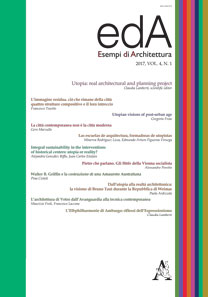Estratto da
ESEMPI DI ARCHITETTURA
International Journal of Architecture and Engineering
Las escuelas de arquitectura, formadoras de utopistas. Architecture schools, trainers of utopians
ESEMPI DI ARCHITETTURA
International Journal of Architecture and Engineering
Las escuelas de arquitectura, formadoras de utopistas. Architecture schools, trainers of utopians

Architecture schools now focus primarily on enhancing architectural landmarks that are deftly erected in different parts of the world, forgetting the context, as well as the repercussions of a project of this magnitude for the local inhabitants, affecting from the economy to the historical cultural presence. Under the scheme of globalization everyday are built utopian cities, designed for an ideal world, where the user do not need to move, where services are enough and communicated properly. In addition, globalization leaves as legacy buildings that lack local identity, without roots, which although they integrate high technology, materials and innovative construction systems, lack a local reference. The architecture of our times is centered on exploiting a selfish spirit, in which, only, the self-lucidity boosts, boasting with each construction, fomenting the megalomania of the architect; a situation that ends in a grotesque competition of heights, shapes, textures, rhythms, and proportions that saturate spaces, affecting the image of cities, even crushing the cultural heritage of peoples. Unfortunately, architecture schools sometimes focus on praise architectural creation and all those virtues it possesses; but analyzing it in isolation, decontextualizing without understanding the spatial-functional repercussions that affect the inhabitants of the locality. The teaching of architecture has diversified its areas, exploring from historical to structural aspects to legal ones, with the purpose of orienting them to design; But in practice this situation rarely occurs, because they are studied individually, giving more relevance to the creative part that resolves spaces but not contexts, promoting unrelated projects conceived for utopian conditions; omitting the ancestral teaching of the constructive tradition of the people to focus on modernity.
| pagine: | 33-40 |
| DOI: | 10.4399/97888548991934 |
| data pubblicazione: | Giugno 2017 |
| editore: | Aracne |








